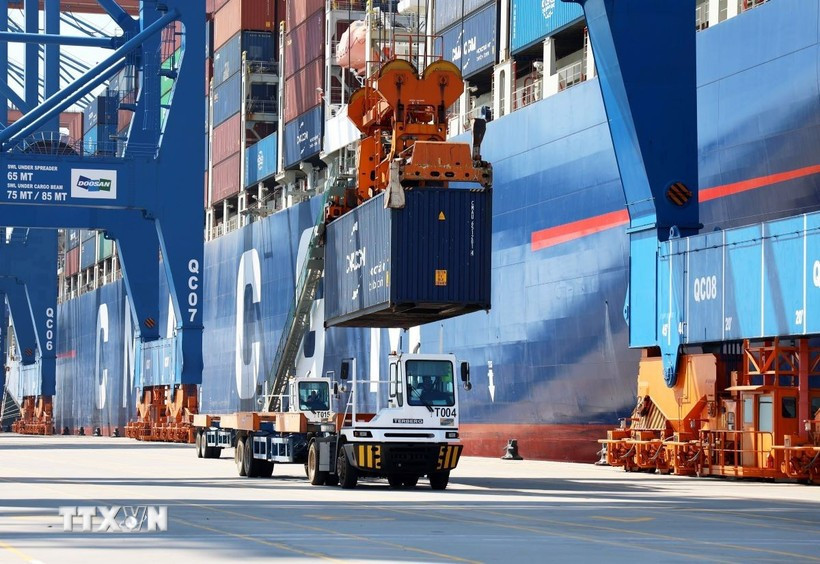Stronger British investment in Vietnam expected this year
British investment in Vietnam is expected to grow in key sectors such as renewable energy, digital transformation, advanced manufacturing, and finance. Denzel Eades, chairman of the British Chamber of Commerce (BritCham) in Vietnam, spoke with VIR’s Bich Thuy about future trends.

What British business and investment trends do you foresee in 2025?
We expect to see continued growth in key sectors such as renewable energy, digital transformation, advanced manufacturing, and finance. As Vietnam strengthens its position as a crucial player in the global supply chain, British companies are likely to ramp up investment in smart manufacturing technologies and automation, which will enhance efficiency and competitiveness.
The finance sector will play a pivotal role in driving Vietnam’s development momentum. Global financial institutions are expected to increase their involvement in projects that support sustainable growth, particularly in areas like renewable energy and social impact initiatives.
We anticipate that the education and healthcare sectors will also continue to pull in investment, particularly as Vietnam’s middle class expands and demand for high-quality services rises. The growing interest in sustainability and environmental, social, and governance (ESG) focused investments is also expected to accelerate in 2025.
What are the expectations about legal changes and improvements to facilitate future operations?
British businesses in Vietnam are optimistic about continued legal reform. Key areas of focus in 2025 include streamlining of administrative procedures. Although the government has made progress in this area, businesses look forward to continued improvements, particularly in simplifying customs procedures, tax compliance, and licensing processes. Faster and more transparent administrative processes would greatly benefit companies looking to expand their operations.
Given the global focus on sustainability, businesses hope to see more incentives that encourage green investments and the adoption of digital technologies. These could include tax breaks, subsidies, or favourable loan terms for companies that commit to sustainable practices or invest in technology-driven solutions.
How have member companies of the BritCham had success, while leveraging benefits of the UK-Vietnam Free Trade Agreement?
While there were clear global headwinds in 2024, Vietnam witnessed robust annual GDP growth of over 7 per cent.
Within this context, BritCham members were successful where they capitalised on the growth in Vietnam’s domestic demand, whilst simultaneously leveraging the benefits of the agreement. Key growth sectors in the last 12 months included AI, technology, education, healthcare, and renewable energy. Drivers for growth in these areas include adaptability, digitalisation and the development of successful local partnerships.
British educational institutions operating in Vietnam which pivoted towards digital learning models and collaborated with local partners to enhance their curriculum and reach were successful.
Similarly, companies participating in Vietnam’s energy transition have been successful when working in partnership with Vietnamese power initiative developers and leveraging preferential financing arrangements from export credit agencies and development banks.
However, challenges persisted in areas such as supply chain disruptions, rising input costs, and where the development of policy and regulation is ongoing. Manufacturing companies were also impacted by pressures on global demand and rising raw material costs.
Where did British investment in Vietnam go in 2024, and what were the drivers of investment growth?
Bilateral trade between Vietnam and the UK grew to in excess of $8 billion in 2024 and British investment in Vietnam has remained robust. We have seen consistent and growing interest in key sectors including finance, infrastructure, renewable energy, and education.
Compared to previous years, there’s been a marked increase in interest from British investors in Vietnam’s digital economy. Vietnam has leading companies and human capital in the tech sector.
In parallel, the country is implementing a programme of digitalisation. As a consequence, British tech firms see great potential in collaborating with local businesses to support digital transformation and innovation.
Additionally, as Vietnam continues to position itself as a regional manufacturing hub, British investors have explored opportunities in sectors such as advanced manufacturing and smart technology, especially in relation to Industry 4.0.
We have also seen enthusiasm from British investors with strategies focused on the shift towards more sustainable and impact-driven investments. The focus on ESG has been particularly evident, with companies keen to align their business models with both local government initiatives and international standards.
The Vietnamese government has made significant strides in improving the business climate in 2024, particularly through its focus on streamlining administrative procedures and enhancing transparency. The government’s efforts to reform tax regulations, simplify licensing processes, and bolster infrastructure development have been well received by the British business community
One notable example is the National Digital Transformation Programme, which has helped businesses digitalise their operations, making it easier for them to expand and integrate into global value chains. The government’s push to reduce bureaucracy and enhance the ease of doing business through online platforms has been beneficial, though BritCham members have highlighted the need for improvement in the consistency of these measures across different provinces and sectors.
By Bich Thuy
Source: VIR
Original link







